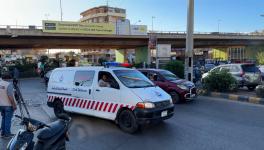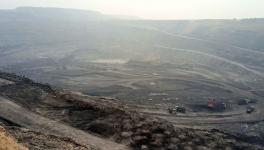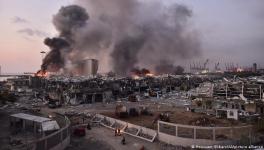Lebanon Lacks Resources For Emotional Trauma, Mental Health
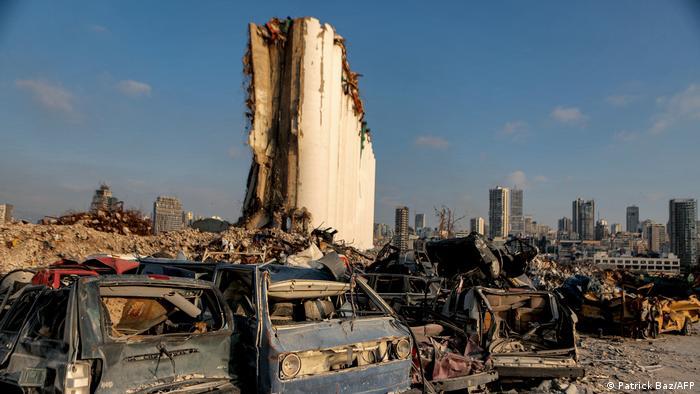
Grain silos at the port of Lebanon's capital, Beirut, have become the symbol of the blast
It took a long time for Mira to talk about what she went through.
On August 4, 2020, the day of Beirut's port blast, she was sitting in a coffee shop on the opposite side of the harbor. "Suddenly we heard a loud explosion," Mira, who is 30 and asked that her real name not be used, told DW. "Windows shattered, and everyone took shelter on the ground."
About 2,750 tons of unsecured stored ammonium nitrate had blown up, killing more than 200 people and injuring thousands.
"Since then, nothing has been the same for me," Mira said.
"Since then, I get scared when I hear loud noises or when I see smoke rising," she said. "I need to seek shelter indoors immediately."
The death of a young female firefighter particularly affected Mira. "I think of her often," she said. "She was engaged, like me."
"I've always wanted to join the volunteer fire department, too," Mira said. "Only, my parents didn't let me do it."
Though she didn't know the young woman personally, Mira said, "I have a guilty conscience that I survived."
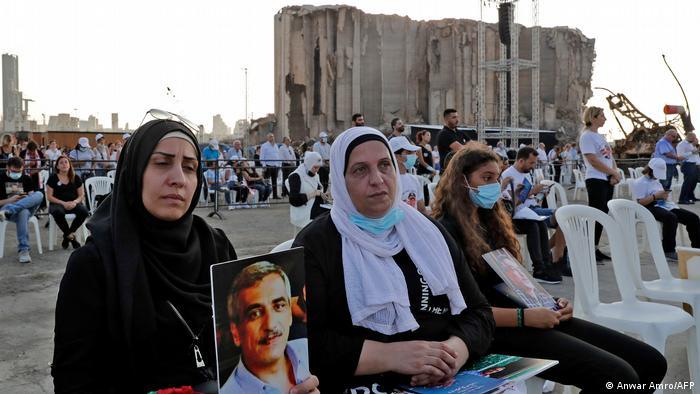
Many struggle with the consequences of the blast — economically and emotionally
Depression, anxiety, PTSD
The images of the explosion were shocking for people around the world.
Though some of the streets in the port area have since been rebuilt and repaired, many in Beirut continue to experience emotional trauma a year and a half later.
"I have many friends who are seeking psychological help," Mira said.
"We don't have national surveys in Lebanon about the extent of mental health problems, but we can look at trends, at clinical trends, and look at what we see in clinics. And clearly, over the past two years, more people have been entering the mental health care system, seeing doctors, psychologists, therapists," Dr. Joseph El-Khoury, a professor of psychiatry and the president of the Lebanese Psychiatric Society, told DW.
I start today my mandate as president of the Lebanese Psychiatric Society in difficult times for the profession, the mental health community and the country. The exodus of doctors, the crisis of services and the medication shortages add to longstanding challenges such as stigma. pic.twitter.com/ZVkLUY0PhX
— Joseph El-Khoury (@JEK_Psych) December 2, 2021
A lot of these patients attribute — temporarily at least — their problems to that period or to events in that period.
"We have seen a rise in post-traumatic stress disorder (PTSD) after the Beirut blast, as well as a rise in anxiety and depression, which are generally the type of mental disorders happening in response to stressful events," Khoury said.
Emotional, economic anxiety
Khoury said it was difficult to attribute mental disorders to a single cause and that emotional reactions do not always have to stem from the various crises in Lebanon, which is home to a unique combination of stressors.
One crisis follows the next as the country lurches toward bankruptcy: The Lebanese pound, which was pegged to the dollar exchange rate for three decades, has lost about 90% of its value in the past two years.
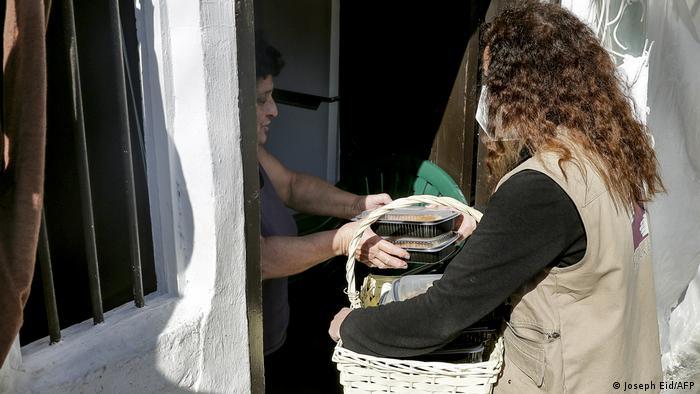
More than half of Lebanon's population receives subsidies
In its recent Lebanon Economic Monitor report, the World Bank describes the situation as one of the deepest economic crises in recent global history.
Four in 10 Lebanese people are without a job, which has been exacerbated by the pandemic.
Many businesses have closed down, and people are unable to access their savings because of the economic crisis.
Fears for future
All of this had had an impact on Mira months before the explosion.
As early as in late 2019, when the economic situation was already worsening, she noticed that her social behavior was changing.
"I developed fears about the future and asked myself: 'How can I build a life in this country?' or 'How can I have children in this country?'" Mira said. "I became more and more withdrawn, sometimes not leaving my room for days — just functioning."
Mira fully collapsed after her dog was poisoned. In the beginning of the pandemic, fake news was spreading that pets could also pass the virus. "That was so hard for me," Mira said.
Not enough psychiatrists
Now, Mira is meeting up with friends again. She occasionally goes to coffee shops. But the fear of unexpected noises and smoke persists.
Mira has confided in friends and asked for advice. "But, so far, I haven't found a psychologist," she said. "And I would like to have someone with experience in trauma."
She doesn't want online therapy, which an increasing number of people are turning to.
The psychologist Therese Ward told DW that she has many patients who talk to her about their fears and worries in virtual sessions. "People are struggling to manage their everyday lives," Ward said. "They have fears about the future. They also often tell me about an inner emptiness."
Waiting lists for in-person therapy are long, Ward said.
The situation is exacerbated by an increasing shortage of psychiatrists and psychologists.
Like many other doctors, a high number of psychiatrists and psychologists have either left the country or are on the way out, Khoury said.
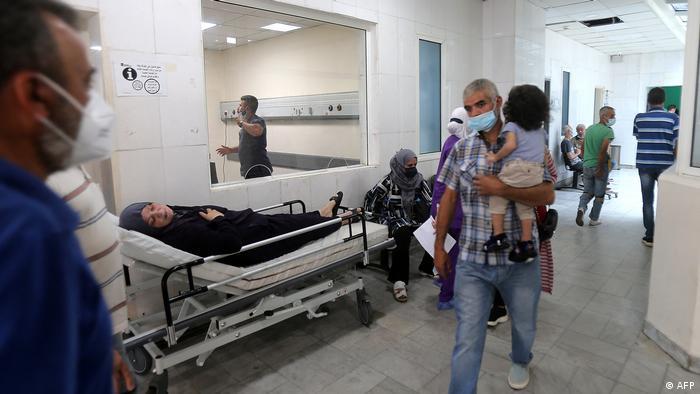
Lebanon's crashing economy has left hospitals increasingly ill-equipped
Medicine subsidies cut
In November, Lebanese Health Minister Firass Abiad announced a partial cut to subsidies for medication to treat chronic diseases.
The prices of many drugs skyrocketed.
For example, medicine for mental illnesses such as depression and schizophrenia are now three times as expensive as before the announcement.
"Most medicines have become either unavailable or extremely expensive since the governmental subsidy has been cut," Khoury said, adding that people are currently using what they have in stock, and some pharmacies are rationing.
"Other people get medicine from Turkey, the UAE or Egypt," Khoury said.
Nonmedicinal therapy is also expensive.
"My insurance doesn't cover the cost of psychological treatments," Mira said.
She would have to pay for her treatment herself. In the ongoing economic crisis, this is a challenge.
Organizations such as the Lebanese NGO Embrace offer psychological support for free. But their service usually involves waiting periods, as more and more people seek free treatments.
Worries about future
Ward said a positive recent development is that there are fewer social stigmas about people experiencing mental illnesses now.
Though she asked that her real name not be published in case future employers search for her on the internet, Mira talks openly about what is bothering her.
"I'm in limbo," Mira said. "I don't know yet what I want to do. I just know I need to seek help. I want to know why I feel this way, why I have these worries and fears, while those responsible for the explosion can sleep well at night."
To date, none of the people believed responsible for the port blast — one of the largest known nonnuclear explosions in history — have been brought to justice.
Over the New Year holiday, Mira, plans to visit some friends abroad with her husband. "We know that the next year will not be any easier," she said. "The Lebanese elections are coming up, and omicron is on the rise. So we want to get a little break."
This article was translated from German.
Get the latest reports & analysis with people's perspective on Protests, movements & deep analytical videos, discussions of the current affairs in your Telegram app. Subscribe to NewsClick's Telegram channel & get Real-Time updates on stories, as they get published on our website.











